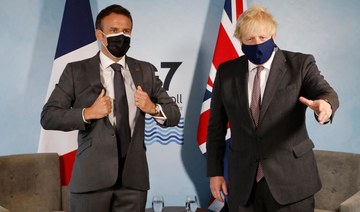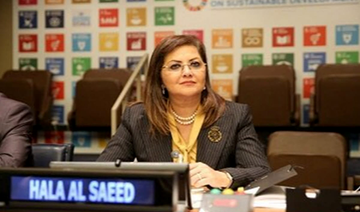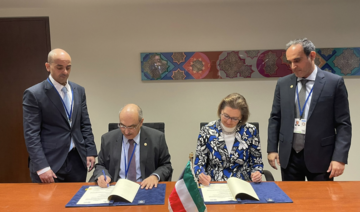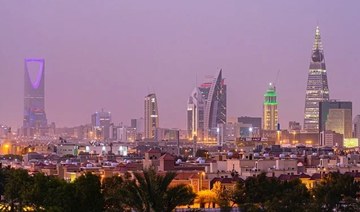CAIRO: Egypt has signed €1.7 billion ($2.06 billion) worth of deals with France to finance projects in the transportation, infrastructure, electricity and wholesale sectors, the cabinet said on Sunday.
Of that financing, €776 million will come from the French government and €990 million from AFD, France's development agency, the cabinet said.
The signings came during a visit by French finance minister Bruno Le Maire to Cairo.
In May, France announced a €4 billion deal to deliver 30 Dassault warplanes to Egypt beginning in 2024, strengthening ties with what it considers a vital partner in fighting Islamist militants.
Projects announced on Sunday by the cabinet include sanitation stations as well as a number of railway projects, including the provision of 55 new cars for the Cairo metro's oldest line and the construction of a railway line between Aswan in southern Egypt and Wadi Halfa in neighbouring Sudan.
AFD will provide €150 million in support of Egypt's universal health insurance programme, the cabinet said.
Egypt signs €1.7 billion of financing deals with France
https://arab.news/j7nk8
Egypt signs €1.7 billion of financing deals with France
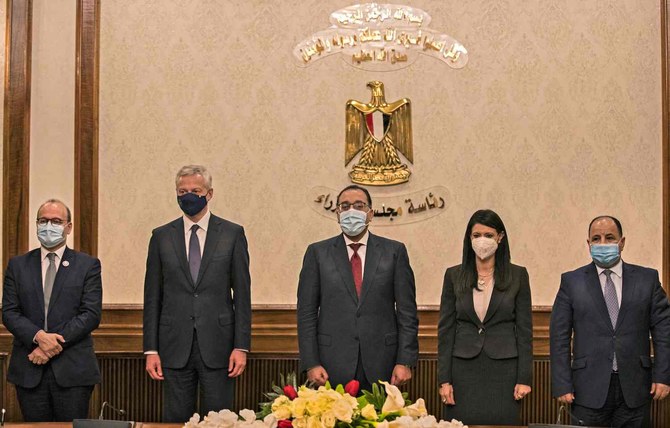
- Of the financing, 776 million euros came from the French government and 990 million euros from AFD
- The signings came during a visit by French finance minister Bruno Le Maire to Cairo
Saudi Arabia’s car imports surge to 160k over last 2 years: official figures

RIYADH: Saudi Arabia’s car imports in 2023 hit 93,199, utilizing all modes of transportation — land, sea, and air — reflecting nearly a 40 percent growth from the previous year.
In the last two years, the Kingdom has imported a total of over 160,000 cars, with 66,870 imports recorded in 2022 alone, according to Hamoud Al-Harbi, the spokesperson for the Zakat, Tax, and Customs Authority, reported Saudi Press Agency.
This positions Saudi Arabia as one of the largest markets globally for automobiles, accounting for more than half of the car sales in the Gulf Cooperation Council countries, and ranking among the top 20 markets worldwide.
According to the authority’s spokesperson, cars were primarily imported from Japan, India, South Korea, the US, and Thailand to the Kingdom during the past two years.
Wael Al-Dhayyab, the official spokesperson for the Saudi Standards, Metrology, and Quality Organization, underscored the rigorous efforts undertaken by the Vehicle Inspection Unit in 2023. They inspected 60,473 vehicles to uphold the highest technical and safety standards.
Concurrently, 18,150 energy efficiency certificates were issued for tire products, highlighting SASO’s commitment to ensuring tire quality and safety in the Saudi market.
Al-Dhayyab emphasized that these endeavors demonstrate the organization’s dedication to enforcing stringent standards, fostering tire quality, and safety.
Moreover, he stressed the body’s pivotal role in advancing energy efficiency and endorsing initiatives aimed at enhancing product safety and economic growth.
Additionally, Al-Dhayyab noted a significant milestone in 2023, with SASO awarding 172 conformity certificates for electric vehicles, witnessing a 465 percent surge from the previous year.
This emphasizes the organization’s crucial role in facilitating the shift toward sustainable energy adoption.
Furthermore, he pointed out that the body issued 1,505 fuel efficiency cards for new light vehicles, indicating its commitment to promoting eco-friendly transportation solutions.
The surge in the import of motor vehicles led to Saudi banks witnessing a 7.67 percent increase in letters of credit to the private sector in the first 11 months of 2023, compared to the same period the previous year.
The data, released by the Saudi Central Bank, revealed that settled LCs and received bills to this sector hit SR155.19 billion ($41.38 billion).
LCs, a financial document issued by a bank, guarantee payment to the seller upon fulfilling specified conditions in a trade transaction.
The growth is primarily attributed to an upsurge in the import of motor vehicles, accounting for around 75 percent of the overall increase.
The import value in this category reached SR39.7 billion, marking a 26.29 percent increase, the data showed.
UAE’s Mubadala Capital plans $13.5bn investment in Brazil’s biofuel sector
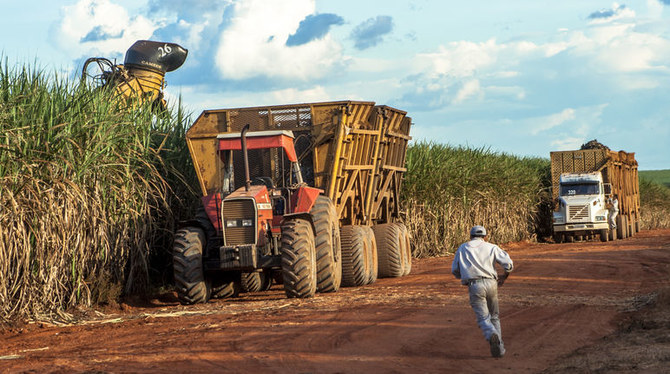
RIYADH: Brazil’s biofuel market is set for substantial growth as UAE’s Mubadala Capital has committed to invest $13.5 billion over the next decade.
Oscar Fahlgren, head of Brazil strategy at the sovereign wealth fund, disclosed the budget for the initiative during an interview with the Financial Times. He divulged the details of the fund’s plans to produce renewable diesel and sustainable aviation kerosene primarily utilizing non-food plant matter.
In his interview with the newspaper, Fahlgren said Mubadala’s Brazilian subsidiary, Acelen, will initiate the development of a large-scale biofuel project by 2026.
The fund’s executive stated that the funds will be sourced through a blend of equity and debt over a span of five to 10 years.
The endeavor will encompass five modules, each valued at $2.7 billion, housing a new biorefinery capable of processing 20,000 barrels of fuel per day. Additionally, it will include the necessary infrastructure and cultivated acreage to sustain the input crop.
“It’s all about feedstock (which) in reality is agriculture. And Brazil is probably the best-placed country on the planet when it comes to agricultural proficiency because of the climate and the fertile soil,” said Fahlgren, adding, “Brazil is to agriculture what Abu Dhabi is to oil.”
The project will also include the conversion of an existing oil refinery in the northeastern Brazilian state of Bahia acquired from government-owned Petrobras in 2021.
“It’s a very important capital project,” Fahlgren said. “I see tremendous opportunity to invest in the green energy transition space in Brazil,” he added.
Mubadala’s venture into bioenergy will leverage its existing $6 billion investments in the country, constituting approximately a quarter of the group’s global portfolio.
“We’ve been very active investing in Brazil, for the past 10-plus years, in an environment where most foreign investors have been shying away,” Fahlgren said.
Mubadala also plans to open a stock exchange in Brazil next year through its Americas Trading Group.
“Brazil is a very large country. It has only one stock exchange. And I think that’s suboptimal infrastructure for the players that operate in this segment,” said Fahlgren.
“It will probably be a staged launch — perhaps start with equities, then expand. No asset classes are off the table.”
The asset management arm of the Emirati sovereign wealth fund is increasing its bets on Latin America’s largest economy, where its holdings span metro lines and medical universities to a majority stake in the local owner of the Burger King brand.
“We’re very bullish on the investment climate in Brazil right now and the opportunities we see,” said Fahlgren. “We do have a number of assets that are relatively mature today, and could be potential exit candidates in the not-too-distant future,” he added.
Eastern Province showcases environmental opportunities during investment forum
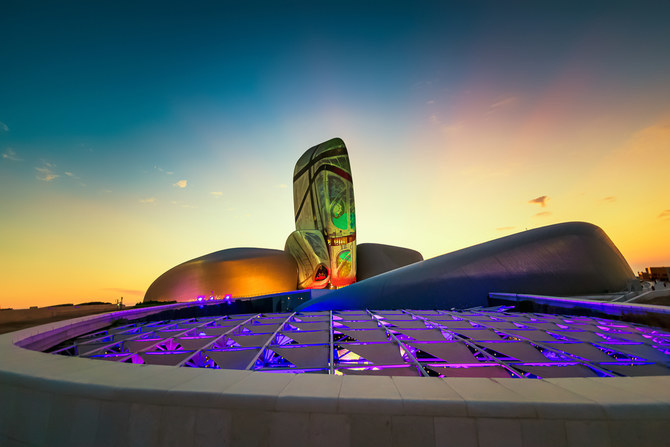
RIYADH: Investors eyeing environmental opportunities in Saudi Arabia’s Eastern Province stand to benefit from a forum held on May 5, amidst efforts to preserve natural resources.
Organized by the Eastern Chamber under the theme “Restoration and Sustainability,” the Environmental Investment Forum 2024 aims to underscore the importance of ecological preservation.
The event, patronized by Prince Saud bin Naif, Gov. of the region, also delves into the effects of environmental regulations and legislation on the business sector, the Saudi Press Agency reported.
Badr bin Suleiman Al-Ruzaiza, chairman of the regional chamber, emphasized the importance of environmental protection within the framework of the Kingdom’s Vision 2030.
He stressed that the country’s ambitious plan views environmental stewardship not only as a religious and ethical imperative but also as a humanitarian duty.
Al-Ruzaiza elaborated that Vision 2030 aims to reduce pollution by improving waste management efficiency across diverse sectors. He underscored the Kingdom’s proactive approach in addressing environmental issues domestically and globally.
The chairman emphasized the paramount significance of the environmental sector in conserving renewable natural resources.
He stressed its pivotal role in laying the essential groundwork for achieving holistic and sustainable growth, ensuring food security, and improving overall quality of life.
He stated that the forum seeks to shed light on the importance of the environment and ways to preserve it, addressing the impact of environmental regulations and legislation on business sectors.
Additionally, it aims to review investment opportunities for businesses in the environmental sector, as well as available financing channels for projects in this vital sector. This represents environmental investment as a key driver and effective element in achieving sustainable development.
Al-Ruzaiza clarified that the forum supports environmental protection practices, presents experiences and solutions, and aims to expand knowledge about investment opportunities related to sustainability. It also focuses on methods for addressing them and implementing associated mechanisms.
He also highlighted the array of sustainability initiatives and programs initiated by the Kingdom to foster green investments across various sectors. Furthermore, he emphasized the nation’s objective of increasing its reliance on clean energy sources, aiming to achieve 50 percent of total energy consumption by 2030.
He also noted the country’s determination to double its spending on investment and financing projects that operate in areas supporting sustainability.
The forum comes against the backdrop of the Eastern Province’s municipality recently unveiling a range of diverse investment opportunities, both permanent and temporary, across cities and governorates in the region.
The municipality had cataloged over 20,000 investment assets covering an area exceeding 116 million sq. m., serving as a database for significant growth in the region, as reported by SPA in March.
These encompass the development of waterfronts, plots, and infrastructure, as well as transportation, markets, and advertising billboards.
Additionally, opportunities for recreational and tourist centers are available. These also cover sports activities, factories, and exhibitions, along with warehouses, workers’ housing, and various tourist and commercial investment sites.
Kuwait’s non-oil sector steadies in April, UAE maintains growth in April

RIYADH: Non-oil activities in Kuwait demonstrated steady growth in April, buoyed by effective advertising and competitive pricing, supporting the expansion in new orders, an economy tracker revealed.
According to the latest Kuwait Purchasing Managers’ Index by S&P Global, the country’s PMI dipped to 51.5 in April from 53.2 in March.
A PMI reading above 50 indicates growth in the non-oil private sector, while readings below 50 signal contraction.
The report noted that job creation scaled back for the first time in eight months as companies aimed to minimize costs, while the rate of purchase price inflation was one of the sharpest on record in April.
According to the survey, this reduction in workforce numbers, coupled with a shortage of available raw materials, led to a buildup of backlogs of work in April.
“The slowdown in growth seen in April is not cause for immediate alarm as Kuwaiti firms were still able to generate solid expansions in new business and output at the start of the second quarter,” said Andrew Harker, economics director at S&P Global Market Intelligence.
The report mentioned that output prices increased only modestly in April, as companies endeavored to limit price hikes to customers by offering discounts.
Furthermore, input costs also surged sharply in April, driven by a marked rise in purchase prices.
“Growth continued to be predicated, at least in part, on competitive pricing. This put pressure on margins given rapidly increasing input costs, however. In a bid to limit expenses, firms cut back on employment numbers, thereby restricting the extent to which they were able to fulfill orders,” said Harker.
He added: “There are clearly risks that this will prove unsustainable and so companies will be hoping that either cost inflation moderates or that demand strengthens sufficiently to reduce the need for discounting in the months ahead.”
UAE maintains strong growth
Meanwhile, in another report released last week, S&P Global revealed that the UAE’s non-oil private sector maintained robust output growth in April. The Emirates’ PMI reached 55.3, down from 56.9 in March but remained firmly above the 50 mark, indicating expansion.
According to the survey, this slowdown was attributed to floods and rains that hit the country in April.
“April data highlighted strong overall growth across the UAE non-oil private sector as buoyant domestic economic conditions helped to support long-term business expansion plans. However, the latest survey signaled a sharp slowdown in new business gains in the wake of heavy rainfall and flooding,” said Tim Moore, economics director at S&P Global Market Intelligence.
He added: “Companies operating in Dubai recorded a particularly acute loss of sales momentum as adverse weather disruptions hit business and consumer spending.”
S&P Global revealed that backlogs of work increased considerably in April, attributed to temporary business disruptions and heightened pressure on operating capacity.
The report added that non-oil businesses in the UAE remained optimistic about future output over the next year, although the level of optimism eased, dropping to its lowest reading since January.
“Non-energy businesses are nonetheless still highly upbeat about their year ahead growth prospects. Many commented on strong sales pipelines and swift recovery from the impact of heavy rainfall,” noted Moore.
According to the survey, higher levels of employment were recorded in April, driven by new project starts and resilient demand conditions.
Saudi Arabia’s non-oil sector maintains growth with steady PMI of 57 in April
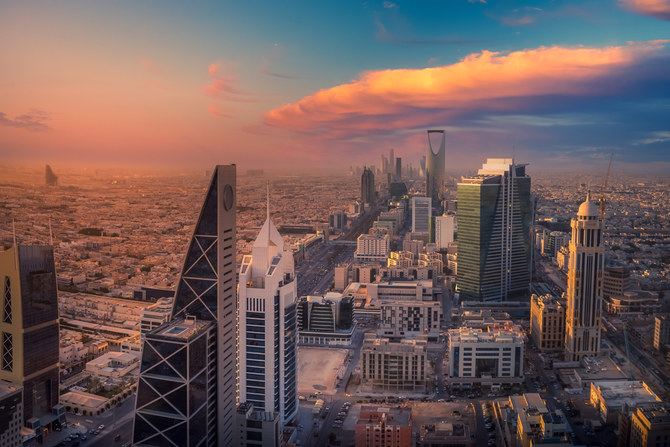
RIYADH: Saudi Arabia’s non-oil private sector continued its growth momentum in April, driven by strong demand conditions across domestic markets, as indicated by an economic tracker.
The Kingdom’s Purchasing Managers’ Index in April remained unchanged at 57 compared to March, signifying a flourishing non-oil economy in the country, according to the Riyad Bank Saudi Arabia PMI report by S&P Global.
In February, PMI hit a five-month high of 57.2, while it was 55.4 in January.
According to S&P Global, any PMI reading above 50 indicates growth in the non-oil sector, while readings below 50 signal contraction.
David Owen, senior economist at S&P Global Market Intelligence, said: “The latest Saudi PMI has sustained a robust figure of 57.0 for the second consecutive month, signifying a flourishing non-oil economy. This uptrend hints at an anticipated spike in the non-oil GDP, likely exceeding the 4.5 percent mark for this year.”
He added: “Noteworthy is the surge in new orders and inventory expansion, indicative of a proactive response to mounting demand within the market.”
According to the report, expectations of strong sales performance drove companies to increase their purchasing activities in April, while cost considerations caused a decline in job creation during the month.
S&P Global highlighted that the overall rate of input price inflation eased to a nine-month low in April.
“Despite a decline in employment figures, there’s a notable increase in the costs associated with employment to incentivize the workforce. This strategy aims to bolster productivity and ensure the retention of skilled workers within the expanding economy,” added Owen.
Competitive pricing, promotional activity, investment, and expanding client bases, particularly in the domestic market, were other crucial factors that propelled the non-oil private sector in the Kingdom in April, the report noted.
Regarding the future outlook, most of the companies in Saudi Arabia that took part in the survey expressed a positive view due to continued improvement in sales performances in April.
“The prevailing strength in demand, along with strategic marketing initiatives and corporate expansions in both wholesale and retail sectors, further fortifies the positive trajectory of the Saudi economy,” Owen said.
He concluded: “The sustained expansion, coupled with evolving market dynamics, underscores a favorable environment for continued economic prosperity and stability in Saudi Arabia’s non-oil economy.”




